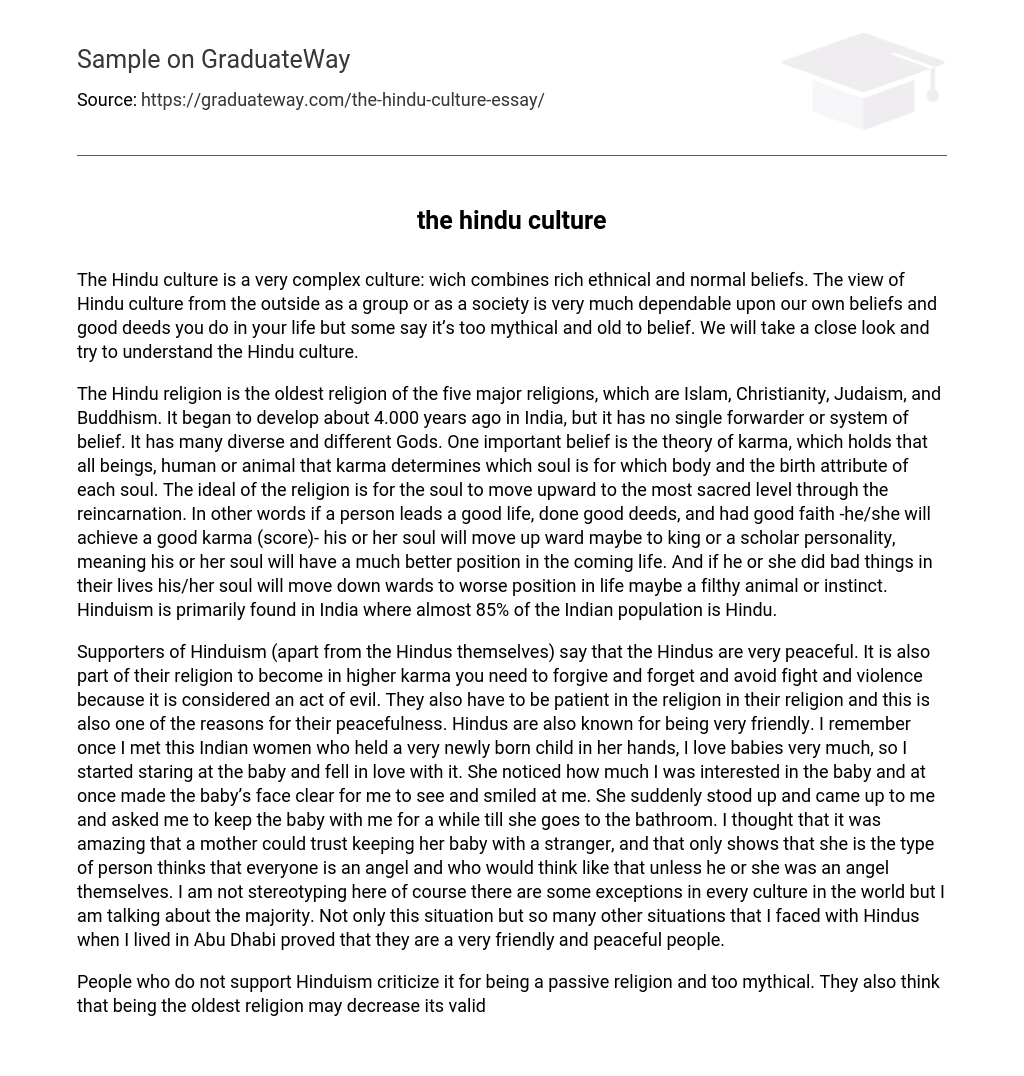The Hindu culture is a intricate culture that encompasses a fusion of ethnic and religious beliefs. The perception of Hindu culture, whether as a collective or as a society, varies based on individual beliefs and the positive actions one undertakes in their life. However, some deem it as overly mythical and outdated. In this analysis, we will closely examine and endeavor to comprehend the Hindu culture.
The Hindu religion, which originated in India 4,000 years ago, is considered the oldest of the five major religions: Islam, Christianity, Judaism, Buddhism, and Hinduism. Unlike the other four religions, Hinduism does not have a single founder or specific beliefs but encompasses various gods and goddesses. One important principle in Hinduism is karma – it states that a person’s soul’s reincarnation and attributes in each new life are determined by their accumulated karma.
According to this belief system, individuals can reach higher levels through multiple reincarnations. By leading a virtuous life and performing good deeds with strong faith, one can accumulate positive karma. This accumulation may result in attaining higher positions such as that of a king or scholar in future lives. Conversely, engaging in wrongdoing throughout life leads to the descent of one’s soul into lower positions like inhabiting the body of an animal or an instinct-driven being.
Hinduism predominantly thrives in India where approximately 85% of the population identifies as Hindus.Hinduism supporters, including Hindus themselves, assert that Hindus are renowned for their peaceful nature. According to their religious beliefs, attaining higher karma necessitates forgiveness and abstaining from conflicts and violence since they are deemed as wicked actions. Their teachings also emphasize the significance of patience, which contributes to their composed demeanor. The Hindu community is widely acknowledged for its amicability.
Personally, I encountered an Indian woman holding a newborn baby. Being fond of infants, I couldn’t help but admire the child and immediately felt a connection. Sensing my interest, the woman adjusted the baby’s face so that I could have a clear view and warmly smiled at me. Unexpectedly, she approached me and asked if I could briefly look after the baby while she used the restroom. It astounded me that she entrusted her child with a stranger, thereby demonstrating her belief in inherent goodness – a quality often associated with angels.
It should be noted that this does not imply every individual in Hindu culture conforms to this description as exceptions exist within all cultures worldwide. Nevertheless, based on my personal experiences and interactions with Hindus during my time in Abu Dhabi, most exhibited friendliness and peace.
People who are critical of Hinduism argue that it is a passive and excessively mythical religion. Additionally, they believe that its status as the oldest religion might undermine its credibility. However, proponents of Hinduism may counter this by asserting that it is the foundation of all other religions. Non-believers often perceive Hinduism as merely a captivating fairytale for children, like Cinderella, rather than a guiding faith.
Yes, Hindus demonstrate passivity, but not in a foolish manner. A prime example is Gandhi, who utilized his beliefs to liberate India from British colonization.
Although I do not follow Hinduism, I believe it is important to respect others’ beliefs in order to earn respect for our own. Many people perceive Hindus as passive, but this is a misconception. Simple Hindus honor those who deserve respect and avoid those who promote violence. It is remarkable that they uphold these morals in a violent world. It takes great strength and intelligence to remain steadfast in one’s beliefs, regardless of whether they are based on myth or reality. In conclusion, Hindus are unique and their commitment to peace distinguishes them. They are genuinely good individuals who strive for positive karma.
In 1993, an encyclopedia called the Learning Library was published in England.





